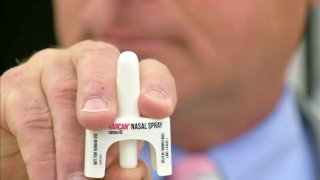
In the face of the deadliest epidemic in the history of the U.S., a local university is taking a step toward a local solution.
The University of North Texas Health Science Center at Fort Worth is leading in promoting opioid and fentanyl awareness and prevention by launching its own One Pill Kills campaign.
Texas Gov. Greg Abbot (R) announced the state’s $10 million One Pill Kills campaign in April, which included distributing Narcan to every county in the state.
A synthetic opioid that’s considered exponentially more addictive than heroin, fentanyl is now the leading cause of death for Americans ages 18 to 49. It can be fatal to ingest even a tiny amount, so small it could fit on a pencil eraser.
Get DFW local news, weather forecasts and entertainment stories to your inbox. Sign up for NBC DFW newsletters.
The initiative by UNTHSC includes several events related to opioids and addiction. SaferCare Texas, the university’s patient-safety-focused department, will host a free Overcoming Opioids: Awareness and Prevention Event from 1 p.m. to 3 p.m. Oct. 12 in Room 109-111 of the HSC Medical Education & Training Building, 1000 Montgomery Street.
The event will include training about how to use the life-saving drug Narcan to reverse overdoses and a keynote speech by School of Public Health professor and nationally recognized opioid expert Dr. Scott Walters. It also will include a personal account by We Are Our Brother’s Keeper founder Jessica Castro about losing her son to an overdose, a digital reflection board where attendees can anonymously share their experiences with opioids and addiction, and more.
The free event is open to the public but does require registration.
Local
The latest news from around North Texas.
“This initiative represents a line in the sand for SaferCare Texas and HSC,” said Dr. Teresa Wagner, SaferCare interim director. “Now is the time to act and equip our community with the skills and knowledge to save lives. I couldn’t be prouder of our campus for coming together on such a vital campaign.”
HSC’s School of Biomedical Sciences also will host two addiction expert speakers in October as a part of its Pharmacology & Neuroscience Research Seminar Series.
At 11 a.m. Oct 17, Baylor College of Medicine’s Dr. Thomas Kosten will virtually present “Anti-Addiction Vaccines Against Fentanyl and Cocaine.” At 11 a.m. Oct. 24 in Room 524 of HSC’s Everett Education and Administration Building, The Medical University of South Carolina’s Dr. Antonieta Lavin will present “Chronic Methamphetamine Administration Produces Cognitive Deficits Through Augmentation of GABAergic Synaptic Transmission in the Prefrontal Cortex.”
Both events are free and open to the public, and neither require registration.
UNTHSC has created a website with helpful resources for anyone who is struggling with addiction, knows someone who is or wants to get involved with prevention. There also is a list of HSC leaders and faculty experts who have published research related to opioids, addiction, or relevant topics; opioid-related stories written about campus stakeholders; and a toolkit with media assets for other organizations that want to replicate HSC’s campaign.
WHAT IS NARCAN?
According to the manufacturer, "Narcan nasal spray is a prescription medicine used for the treatment of a known or suspected opioid overdose emergency with signs of breathing problems and severe sleepiness or not being able to respond."
The active ingredient in Narcan is naloxone hydrochloride. Narcan is the brand name for the device that delivers naloxone into the nasal cavity.
According to the Substance Abuse and Mental Health Services Administration, naloxone is an FDA-approved opioid antagonist medication that is used to reverse an opioid overdose. SAMHSA said naloxone is a temporary treatment and its effects do not last long so it's critical to obtain medical intervention as soon as possible after administering or receiving naloxone.
WHAT IS NALOXONE?
According to the National Institutes of Health's National Institute on Drug Abuse, naloxone is a medicine that can rapidly reverse an opioid overdose by attaching itself to opioid receptors and either reversing or blocking the effects of opioids.
"Naloxone can quickly restore normal breathing to a person if their breathing has slowed or stopped because of an opioid overdose. But, naloxone has no effect on someone who does not have opioids in their system, and it is not a treatment for opioid use disorder. Examples of opioids include heroin, fentanyl, oxycodone (OxyContin), hydrocodone (Vicodin), codeine, and morphine.
Naloxone comes in two FDA-approved forms, injectable and as a nasal spray.
Naloxone works for only 30 to 90 minutes and many opioids remain in the body longer than that. It is possible for a person to still experience the effects of an overdose after a dose of naloxone wears off so it's imperative to call 911 or get the overdosing person medical attention as soon as possible after the dose is administered.
The U.S. Food and Drug Administration on March 29, 2023, approved selling naloxone without a prescription, setting the overdose-reversing drug on course to become the first opioid treatment drug to be sold over the counter.
DOES THE FDA APPROVAL MEAN I CAN BUY IT AT CVS OR WALGREENS?
Yes. Narcan was expected to be available over-the-counter at pharmacies by late summer, the company said.
Other brands of naloxone and injectable forms will not yet be available over the counter, but they could be soon.
The nonprofit Harm Reduction Therapeutics Inc., which has funding from OxyContin maker Purdue Pharma, has an application before the FDA to distribute its version of spray naloxone without a prescription
Once available over the counter, the drug could be available at places without pharmacies, like convenience stores, supermarkets and from online retailers.



